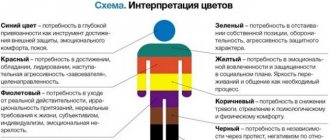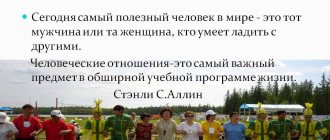Recently, psychologists have been saying that everything a person does is dictated by his good intentions. Experts from the online magazine psytheater.com associate this with human superconsciousness, the concept and development of which will be discussed in the article.
Usually people divide actions into good and bad. The former bring benefit to everyone who encountered them (the person and others at whom they were directed), while the latter, on the contrary, cause harm. The person who committed the act can also say that he did something bad or wrong, and then feel remorse or guilt. However, the sages say that nothing was done by chance, everything has a motive for accomplishment. If a person did something wrong or bad, this act had predisposing factors that were primarily transformed and aimed at a good cause.
A discussion of the topic of superconsciousness, which every person possesses, will tell us how bad deeds, even the most terrible and wrong, are good.
What is superconsciousness?
What is superconsciousness? To define the concept, you need to understand what consciousness is. The term consists of two definitions: “with” and “knowledge”. "Co" means "joint" and "knowledge" implies information. Thus, a person receives information together with someone or from someone. To realize means to comprehend the information that a person received from the outside world.
However, consciousness is only a part of human mental activity. Here the subconscious and superconscious are also distinguished.
The subconscious is remarkable in that it is the baggage of the experiences that a person has gone through. Here is everything that a person has encountered, that he has ever studied, that he has ever experienced, what unconscious conclusions he has made, habits that were formed with or without his will, as well as everything that a person has not noticed or perceived consciously, but he experienced it, saw it or experienced it.
The entire memory of human life is stored in the subconscious. Its main function is to develop automatic actions, decisions and emotional reactions to free the mind from mental stress. In other words, if a person repeatedly encounters angry dogs, then after the first meetings he develops a model of behavior that he then begins to use, and it soon becomes his habit if it gives a more or less desired result.
When achieving goals, many people are faced with the fact that they cannot do anything. Often goals remain unfulfilled dreams that a person dreams about and cannot understand why he does not achieve them. The reason for this is his subconscious, which already has a certain set of automatic actions that a person must perform without thinking in order to relieve the consciousness of new information that needs to be thought about.
Let's take an obvious example: a person wants to quit smoking. On the first day, he may make every effort not to touch cigarettes. But then force majeure occurs at work: some work problems of an unforeseen nature capture the entire mind of the person who begins to think about them. Consciousness is busy thinking about problems and solving them, while it does not control those subconscious messages that dictate to a person how to calm himself down and stabilize himself in a situation of stress. And here the person does not notice how he lights up again. He cannot stop his habit, which is already fixed in the subconscious, while he is under stress and his consciousness is busy thinking about the problem.
But when all work issues are resolved, a person will again be able to devote his consciousness to controlling the messages of the subconscious, until he is again overwhelmed by some problems or new information.
The good thing about the subconscious is that it retains all the experience and acquired skills, knowledge, and conclusions. Under its influence, a person acts automatically, without thinking, which allows him to quickly respond to familiar and previously familiar external stimuli. Consciousness is freed, there is no mental stress, a person acts automatically, even if this does not give him the opportunity to achieve his goals, he at least remains calm.
The subconscious allows a person to remain calm, because it always leads him to those places where he is used to being, and to perform those actions that give a predictable result. This can be a disadvantage, since habitual actions do not allow a person to achieve goals (this is something that a person does not yet have, since his usual actions do not lead him to this). The subconscious is conservative - it stores everything that is understandable and familiar to a person, completely rejecting everything new. But to achieve goals, a person must perform unusual and new actions.
Another form of the psyche is superconsciousness. It refers to creativity, the untapped potential of a person. The superconscious can be called a generator of new ideas, which include unusual information, emotional experiences, and the desire to satisfy one’s needs.
The superconscious is as unconscious as the subconscious. His task is to find new solutions, ideas, and ways out of difficult situations. This is the so-called insight, intuition, illumination, etc., which involves a person’s awareness of some new idea that he did not previously know or did not adhere to.
Superconsciousness can be called the source of human evolution, which begins to become better, more universal, more perfect. Superconsciousness involves a person going beyond the boundaries of his usual environment. If, for example, a person does not know what is behind the doors of his apartment, then the subconscious can be called life within the apartment, where everything is calm and familiar, and the superconscious is going beyond the apartment, when a person begins to encounter new information, become aware of it, make it part of your experience.
Superconsciousness is creative intuition, when a person in a difficult or even ordinary situation finds a way out that he has never used. This is a new vision of the world, this is the desire to perform unusual actions for oneself, this is creation, creation.
The disadvantage of superconsciousness is that it contributes to the destruction of the usual, including traditions, values, old views of the world, etc. This is what society does not like, which obeys the same principles and laws of life, and now must accept new ideas. This can be compared to how people habitually believed in the plane of the planet Earth and could not believe that it was round.
Superconsciousness is a hypothesis. A person gives out a certain idea as a final result, but cannot trace the path of its origin and correction. Psychologists cannot fully study it due to the unconsciousness of the processes of formation of new ideas that a person gives out.
It is known that superconsciousness is based on the emotional sphere of a person. Emotions are human reactions that tell only one thing, whether his basic needs are satisfied or not. If the needs are satisfied, then the person experiences joy or happiness. Usually in such a situation the superconscious does not work. However, it becomes active under the influence of negative emotions, when a person is dissatisfied with the results he received. He begins to naturally look for ways to satisfy his desires in order to give himself the desired peace and happiness. This is where the superconscious turns on, which is aimed at finding new ways to solve a situation in which a person does not yet see a profitable way out.
P. Simonov
“Science and Life” No. 12, 1975, pp. 45-51.
People have long paid attention to the fact that many manifestations of the vital functions of their body, many types of brain activity take place without the intervention of consciousness. We are not aware of the processes occurring every minute in our internal organs, we do not notice weak or unclear, “masked” effects on vision and hearing, although they are perceived by the brain, this is evidenced by the bioelectric reactions recorded by the device. Moreover, we often cannot explain to ourselves and others how we came up with an interesting scientific idea, an ingenious solution to a technical problem that we have been struggling with for many days.
Unfortunately, the term “subconscious” is used to describe almost everything that is not conscious. As a result, the subconscious has turned into a repository of phenomena that are extremely distant from each other. In this state of affairs, the illusion of the internal kinship of these phenomena arises, and the highest manifestations of the human spirit begin to be seen as a direct consequence of elementary biological impulses - a mistake that the outstanding Austrian psychologist Sigmund Freud did not avoid .
It is obvious that the productivity of the analysis of the “unconscious” depends to a large extent on how clearly we can determine the nature of consciousness itself, not only in the philosophical aspect, that is, as a reflection by the brain of an objective, primary existing reality, but also in a natural sense, from the standpoint of explaining the highest human nervous activity.
Concept of superconsciousness
The superconscious and subconscious are parts of the unconscious activity of the psyche. Consciousness is the conscious part of it. The unconscious part is of interest because it significantly influences a person’s life.
The subconscious is a repository of experience, information, automatic actions, etc. Thus, a person relieves his brain of constantly thinking about the same information. Once he has known it or made a conclusion, accustomed himself to a certain model of behavior, he no longer has to think about it.
The subconscious mind stores everything that a person has absorbed into himself: fears, positive and negative patterns of behavior, conflicts, contradictory concepts, etc. The subconscious mind does not care how a person feels about his negative conclusions or habits. If he continues to use them, does not change them, does not program himself for new beliefs or behavior patterns, then these negative patterns are beneficial to him.
The subconscious is also good because a person quickly navigates a familiar space. He does not think, but quickly analyzes who and what surrounds him and how to behave in such an environment.
If we consider the concept of the superconscious, then it is not controlled by a person, like the subconscious, and is even less studied by psychologists. The fact is that a person is faced with the final result of the activity of his superconscious - an insight, a hypothesis, a new idea.
Superconsciousness is a situational phenomenon that produces only a certain idea that corrects or slightly introduces something unusual. In a significant way, the superconscious does not work. It is aimed only at identifying a new option, model of behavior or idea that can be used in a situation or abandoned.
Superconsciousness is based on a person’s desire to satisfy his dominant needs. That is why at the beginning of the article it was said that a person always acts with good intentions:
- He is driven by his basic needs to achieve balance, peace and happiness.
- At the same time, he uses those patterns of behavior that he is usually accustomed to perform in a specific situation and when achieving a certain goal (subconscious).
- If a person develops his superconsciousness, then he will be able to recognize other ways to achieve his goals, taking into account the desires and interests of others, whom he will not harm by his actions and will benefit himself.
Consciousness is socialized knowledge that can be transferred.
An important condition for a successful analysis of the physiological foundations of a particular mental phenomenon is to clarify the essence of this phenomenon. We believe that the key to understanding the nature of the property of the human brain that interests us is contained in its name: “consciousness.” First of all, it is knowledge about something, the truth of which can be verified by practice. “The way in which consciousness exists and in which something exists for it is “knowledge,” noted K. Marx (Marx K., Engels F. - Works - 2nd ed. - T. 3). However, the term “Knowledge” itself needs clarification. Knowledge is not a trace of an event (object), passively imprinted by the structures of the brain. Knowledge is knowledge only to the extent that it can serve as a means of satisfying needs, a means of achieving goals.
Let's say, in a dream or during a short-term display, my brain remembers a signal that I am able to recognize among others if presented. Until this moment, that is, until the reminder, the trace of the signal is stored in my memory, but has not yet become knowledge, since I cannot use it in my goal-directed behavior to satisfy my existing needs.
However, the quality of knowledge as a means of achieving goals is only one, important, but not the only characteristic of knowledge. In the end, the mass of unconscious defensive reflexes, processes of regulation of the activity of internal organs is a means of satisfying the body's needs in maintaining the constancy of its internal environment, in protecting it from the unwanted influences of the surrounding world. Consciousness presupposes precisely co-knowledge (compare with sympathy, compassion, empathy, cooperation, etc.), that is, such knowledge that can be transferred can become the property of other members of society. To realize means to acquire the potential ability to teach, to transfer one’s knowledge to another. Consciousness is initially social in nature, and the sociality of this form of reflective brain activity is included in its internal structure.
So, consciousness is such knowledge about the world, enshrined in the “nervous models” of the brain, which: 1) can be used by a person to organize actions aimed at satisfying his needs; 2) can be transmitted to other members of the community through a second (voice) signaling system.
Development of the superconscious
The most interesting question remains how to develop superconsciousness in yourself. It is quite difficult to answer this if there is no clear understanding of how the process of forming new ideas occurs. However, recommendations can be made for creating enabling situations that can trigger insights:
- A game. Try to play by simulating the situation that has arisen. Be yourself, another person, your opponent, etc. See the situation from different sides in order to be able to understand something new for yourself.
- Get rid of beliefs, principles, attitudes, etc. Do not divide the world into good and bad, black and white, right and wrong. Take everything as a whole, without making judgments.
Go beyond the limitations and “fences” of your consciousness. Set a goal you want to achieve and see what you need to do to get directly there.











